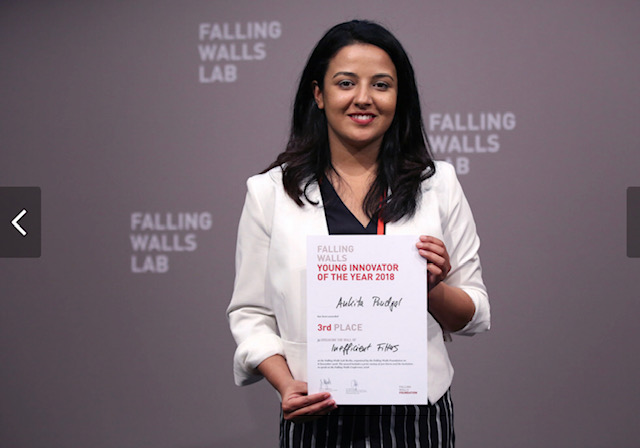Nepali student named Young Innovator of the Year
KATHMANDU: A Nepali student, currently studying in Auckland University of Technology, New Zealand, has been named as one of the Young Innovators of the Year 2018 amidst an international conference recently held in Berlin, Germany.
On the sidelines of the conference on future breakthroughs in science and society organised by the Falling Walls Foundation on November 8-9, Ankita Poudyal won the third place in the finale pitching her idea about combining two technologies to create ideal filters to improve air/water quality. The competition was organised by Falling Walls lab where researchers from across the globe were asked to pitch their ideas in three minutes.
Ankita, who is working on nano-fiber filters that efficiently remove particles and enable good flow with the help of surface coating technology, said most commercial filters in the market that claim high removal of particles are made compact and thick so that most particles are removed but their flow is heavily compromised. “These two functions are mutually exclusive in conventional filters.”
Such filters run at high operation cost, wasting more energy and have problems of frequent clogging, she told THT after receiving the award. “Conversely, if filters are made thinner, they cannot trap tiny particles that are more harmful as they have the ability to penetrate deeper into our cells and cause asthma, cancer and heart diseases.”
During the annual conference, scientists and researchers from around the world also presented their innovative research ideas. Paola Arlotta, professor at Harvard University and a world-leading pioneer on the intersection of neuroscience and stem cell biology, talked about her latest studies have involved 3D cerebral organoids, miniature live brain compounds cultivated from human stem cells which provide a novel platform for ´in vitro´ modelling of diseases and remedies.
Brian Behlendorf, Executive Director at Hyperledger, an international, collaborative effort to find real-world applications of blockchain technology, shared how Hyperledger has grown to include over 160 companies that were looking to incorporate this revolutionary new technology into their business model.
Gerardo Ceballos, Senior Researcher at the Institute of Ecology at UNAM global conservation science, talked about the scientific researches on tackling the loss of biodiversity in his native Mexico and globally.
Kevin Esvelt, director of the Sculpting Evolution Group and Assistant Professor of Media Arts and Sciences at the MIT Media Lab, presented his expertise in genetic engineering as well as a trailblazer when it comes to scientific transparency and ethical research.
In his presentation, Steve Evans, Director of Research at the Institute for Manufacturing at the University of Cambridge described the ways on how the industry can bring environmental and social sustainability concerns into its design and manufacturing practices.
Onur Güntürkün, professor of behavioural neuroscience at Ruhr University Bochum shared his decades-long foundational research into brain development that has been the source of numerous insights on how cognition, thoughts and memories are created in the brain.
Terry Hughes, Director of the Australian Research Council Centre of Excellence for Coral Reef studies, presented his findings on the linkages between the ecology of reefs and their importance for societies and economies.
Professor and chair of the Department of Astronomy at Harvard University Abraham (Avi) Loeb who founded the Black Hole Initiative talked about practical solutions to deep space exploration and the search for signs of extra-terrestrial life.
During the conference, Jan Zielonka is the Professor of European Politics at St. Antony’s College at the University of Oxford shared his insights into the present-day state of liberal democracies.
German Federal Minister of Education and Research Anja Karliczek, Stefania Milan, associate professor of new media and digital culture at the University of Amsterdam, Veena Sahajwalla, Director of the Centre for Sustainable Materials Research and Technology at UNSW Australia, professor of neuroscience and psychiatry Daniela Schiller, Nicola Spaldin, professor and the head of the Materials Theory Group at ETH Zurich and Associate Professor at the University of California Leila Takayama, Chairman of the Board of Trustees at the Falling Walls Foundation, Jürgen Mlynek and Foundation’s Managing Director Tatjana König among others also addressed the conference.
According to Sebastian Turner, Founder at the Falling Walls Foundation the organisation, which was as initiated on the occasion of the 20th anniversary of the fall of the Berlin wall, fostered discussion on research and innovation by promoting the latest scientific findings among a broad audience from all parts of society.






